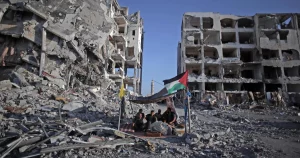We live in interesting times. A pandemic hits and our world is turned upside down. Old certainties quickly unravel. Journalists, pundits and motley humanitarians are grasping at straws to make sense of what is happening and what the consequences will be. Most agree that the straws are falling in uncharted territory.
Soothsayers looking into the nature of the haystack seem to be evenly divided between optimists of action and pessimists of reason. The crisis provides an opportunity for radical change, say the first: neo-liberalism is on its last legs, now is the time for revolution, to wrap Covid-19 response into action on the climate crisis and save the world from itself. Dream on say the naysayers: transnational capitalism will rebound with a vengeance, authoritarian democracy will spread like wildfire, economic recovery will trump citizens’ rights, our digital bodies will evermore be tracked and manipulated, the mushrooming precariat will be hit even more, not to mention the masses at the margins living the dregs of their bare life in what looks increasingly like a globalized state of exception.
In Italian we have an expression tanto peggio, tanto meglio. So much worse, so much the better: if things fall apart, strongmen can exploit the situation to their advantage. That was Mussolini’s strategic gamble in 1920: he used violence, including, but not only, that of his own thugs to bring about authoritarian change and subsequent disaster. So-called ‘natural disasters’ sometimes topple governments (Nicaragua under Somoza) while some provide a springboard for peace (Aceh after the Tsunami). But, frequently, crises are exploited to suppress freedoms viz. land grabbing and dictatorial rule in Sri Lanka after the Tsunami, authoritarian rule by Duterte in the Philippines, Orban in Hungary and others. The narrative of “war” against Covid 19 has triggered open-ended suspension of parliaments and civil liberties. Political gatherings and demonstrations are banned. Accountability for government decisions and lack of preparedness is postponed sine die. “Democracies cannot handle pandemics” is the not so subliminal message coming out of China while Beijing repositions itself geopolitically smelling opportunity in crisis. The end of democracy (in the US) is nigh say reputable thinkers such as Paul Krugman in the New York Times.
All true but misses the point. Quite apart from the fact that some democracies have not done so badly (Taiwan, South Korea, New Zealand come to mind) while others have been failing (US, UK, India), one conclusion that we – concerned citizens – should draw from this deadly crisis is that the so-called nation state is the wrong unit of analysis to get a grip on the unfolding pandemic and how best to get out of it.
Existing multilateral institutions – such as the United Nations (UN), International Monetary Fund (IMF), European Union (EU), African Union – were conceived in a largely bygone era when it was widely believed that cooperation among sovereign states could solve problems requiring international collective action. Successful examples include decolonization, harmonization of norms on telecommunications or trade. Widespread vaccination has greatly contributed to global public health including the eradication of small pox and rinderpest. But multilateralism has been less successful when it comes to ensuring peace and security, or challenging global inequalities and human rights violations. The end of the Cold War created an expectation or an illusion that a new world order might emerge and that multilateralism would thrive. Alas. Over the past 30 years, it has become increasingly apparent that the post WWII multilateral system, for all its successes and failures, had reached its structural limits. The major challenges humanity faces today – climate crisis, unregulated financial capitalism, growing inequality within and among societies, international crime, the arms trade, acts of terror, the inhumanity of protracted warfare, the rise of surveillance states, the abuse and weaponization of the commons… and of course, pandemics – are of a nature and scale that is beyond the capacity of any single state or of states acting in concert mainly by consensus. These challenges are transnational at their core. Multilateralism was not conceived as a tool to deal with transnationality. Today’s institutions were designed for an era when Western dominance was largely unquestioned and the Cold War allowed for a certain geopolitical predictability. The current multilateral system sacralises an outmoded notion of sovereignty in a world transformed by globalizing forces. In transnational times sovereignty becomes a blunt instrument.
Like capitalism, pandemics know no borders. Their modus operandi are the same. The multilateral institutions of nation states are, effectively, powerless vis-à-vis the first and largely irrelevant against the second. The exponential spread of the pandemic is a function of how societies are organized including the role of individual citizens in slowing or facilitating transmission. Like capitalism. Both are manifestations of how the natural equilibrium of the planet has been thrown out of kilter by us humans, and our history of disdain for the laws of nature.
No state is willing or able to claw back control of transnational capital and finance. And all states have adopted a “Ruritania first” approach to Covid-19. Despite its best efforts, WHO is neither designed nor able to orchestrate what is really needed – a truly transnational response where states work together for the common good. Ideally this would require a mix of transparency, accountability and when necessary the mandatory application of commonly agreed rules. If there were a modicum of supra-nationality, states would not be stealing each others face masks and protective equipment. A supranational response may be the most rational option to tackle a pandemic, not to mention the climate crisis. It seems that in times of crisis emotions and perceived self-interest trump reason and joined-up governance. Gordon Brown’s call for a “temporary global government” has been met with deafening silence.
Even the richest countries in the world are discovering that hubris, privatization and the de-funding of welfare state services, including health in particular, have put them in a fix that is, potentially, costing millions of lives. The EU, where some timid form of pooled sovereignty is supposed to obtain, had no contingency plans. In fact, most Europeans recently learned that EU countries hold primary responsibility for organising and delivering health services and medical care – that is, there is no common public health policy (unlike agriculture or even foreign policy for example).
The UN is AWOL. For the past three months the UNSC has not even put Covid-19 on its agenda. Why? The Council’s remit is peace and security and SC members could not agree that Covid-19 would fit into that box. The UNSG’s call for ceasefires in on-going wars has fallen on ears deafened by the sound of gunfire and bombs (with the partial exception of Yemen). With the UN in need of a ventilator, the task of bringing some vision to a coordinated response falls on the WHO, constitutionally reluctant to speak truth to powerful states and unwilling to exercise the robust leadership it had, for example, at the time of the SARS epidemic.
Meanwhile, from Aden to Tripoli to Kabul the fires of war burn out of control, inhumanity spreads unchecked, migrants hit walls, drown or are detained and tortured. Humanitarians are well aware of the suffering and devastation that the pandemic is wreaking in countries weakened by war and years of devastating destruction of vital health, economic and other infrastructure. The world’s 75 million refugees and people who are involuntarily displaced are at particular risk. And nobody knows what pain is in store when “recovery” plans are rolled out.
All around the world the global precariat is on the rise and the fall-out of the pandemic may well result in the exponential growth of the castaways of globalization. Whether refugees, migrants, minorities, and the multitudes of disenfranchised will rise up to challenge the lack of humanity that keeps them enslaved in their struggle for survival remains to be seen. Plagues shake up societies. The Black Death in the Middle Ages accelerated the demise of feudalism in Europe. Epidemics result in scarcity of labour and sometimes give rise to more just remuneration for peasants and workers. Pandemics and wars provide opportunities for reordering the old world.
Things fall apart; the centre cannot hold; Mere anarchy is loosed upon the world
(W.B. Yeats, The Second Coming)
While the four horsemen of the apocalypse – capitalism, climate change, war and pandemic – continue their deadly gyre, will there be some sort of Revelation in the offing? Our leaders are full of passionate intensity, but the way forward is far from clear.
Being by nature a pessoptimist (as in Emile Habiby’s satirical novel from 1974, “The Secret Life of Saeed the Pessoptimist.”), my sense is that the future will be grim but that there will be opportunities for change that the reflective humanitarian citizen must grasp and nurture. I offer some thoughts on what the future may hold for humanitarians:
(a) The human, social and economic cost of the pandemic will be massive, especially in non-OECD countries. Whether or not the state makes a come-back with nationalisations and strengthened welfare state policies is a moot point. Some European states may take this route. Probably the opposite will happen in the rest of the world with cut-throat competition between the US and China heavily defining the global context. We are likely to see a retreat based on wealth: rich countries will try to take care of their electorate and provide at least basic welfare services while the main effort will focus on economic recovery. If, as some predict, the cost of the pandemic will be in the order of 9 trillion USD (10% of the world’s GDP), recovery will be a very rough ride for the vast majority of humankind. Depending on how long the pandemic lasts and how deep it bites into health and social systems already weakened by decades of rampant neoliberalism, we may well find ourselves in a situation where the tax base in OECD states will be insufficient to cover domestic recovery and livelihoods needs as well as development and humanitarian aid. International aid will likely take a big hit.
(b) Multilateralism is collapsing if not already brain dead. Is anyone listening to the UN Secretary General’s and Pope Francis’ pleas for ceasefires? The international “system”, WHO included, has shown its limits, and there are no signs of it being resuscitated. And this at a time where the pandemic (like climate change) shows ever more clearly that transnational problems require transnational responses rather than intergovernmental stasis. Conventional wisdom has it that only world wars have the capacity to trigger enough political will for reforming the international system. Will the pandemic have a similar effect? Could we envisage that the UN shifts away from “We the States” towards “We the peoples”? Will citizens be allowed a say in how international affairs are run? Too early to tell but not too early to reflect on the role of citizens in whatever global dispensation emerges from the pandemic. Citizenship, for now, is inherently linked to the nation-state but recent times have seen the emergence of important networks of individuals pushing for greater justice on a broad range of issues (viz. the various Occupy movements, the revolution in the Sudan and of course climate change). If the nation-state is no longer able to respond to citizens’ needs and is downright hostile to those seeking refuge or lack citizenship, perhaps the time has come to redefine citizenship in planetary rather than purely national terms. Citizens of the world, unite! Well, maybe.
(c) perhaps more worryingly, the crisis is spewing surveillance technologies that are being introduced with little or no democratic control by authoritarian and not so authoritarian governments. Tracking infection is one thing but transforming the most vulnerable into digital bodies that are reduced to bare life is another. These technologies have a habit of being presented as “exceptional” and becoming the new normal after the crisis ends. And what does this mean for the most vulnerable, for asylum seekers fleeing war and persecution whose movements will be more and more tracked in real time? Who will hold the data, store it, analyse it, sell it and profit from it to the detriment of those in greatest need of safety and protection?
(d) The humanitarian ecosystem is ill-equipped for the post-pandemic world. Serious questions must be asked of a system that is so heavily dependent on the goodwill of OECD donors and the vagaries of international finance. Much of the funding for humanitarian action that does not come from states is generated by profits from largely unaccountable private companies including the likes of Microsoft and other multinationals (for example, the Bill and Melinda Gates Foundation is the second largest contributor to WHO). The business model of INGOs (except for MSF and a few others that rely on direct contributions from the public) is very vulnerable and so very colonial in its operating procedures. It is part and parcel of the neo-liberal agenda and still functions as a top-down conveyor belt for western policies, ideas, values. Is this model sustainable in the post-pandemic era? The politics of humanitarian action needs to be re-thought. It may well be that new forms of political action will be required to address global vulnerability (as Julie Billaud argued in an op-ed recently… we need less humanitarian technique and more politics).
The odds against the creation of a more just and sustainable global order are formidable but is there any other option to save future generations from anthropocide than inventing a new form of politics and searching for new ways of thinking, living and working together to move the human dial towards justice? A profound transformation of what it means to project ourselves towards a different future is needed (see Alessandro Monsutti’s essay The Italian laboratory, for better or for worse). Not doing so means accepting the inevitability, and responsibility, of worse disasters to come.
This Opinion piece was penned by Antonio Donini, a UAI Executive Committee founder and member
Views expressed in this opinion piece do not necessarily reflect those of UAI.
Photo credit ©www.tni.org











